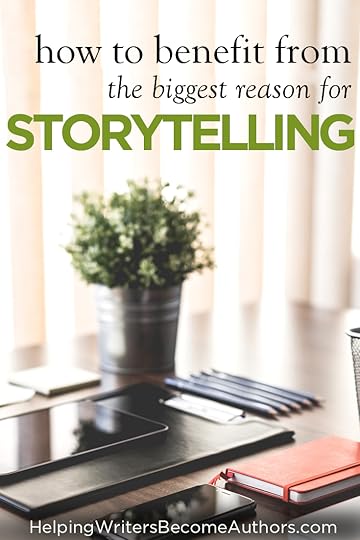 I have a theory. My theory is that a person’s ability to engage with art is directly proportional to that person’s willingness to explore the inner depth of their own lives.
I have a theory. My theory is that a person’s ability to engage with art is directly proportional to that person’s willingness to explore the inner depth of their own lives.
Consider two different people who walk out of a movie theater together (or we could switch out the setting for an art gallery, a concert hall, a library, a playhouse).
They ask each other, “What’d you think?”
The first person is bubbling over with excitement, having glimpsed insights and gathered the beginnings of interesting revelations about life in general and her own life in particular.
Upon hearing all this from the first person, the second person just kinda shrugs and says, “Well, I liked it, but it was just a fun movie.”
Why Appreciating Art = Appreciating Life
This is a scenario I’ve witnessed countless times in my own life (with me admittedly playing the role of Person #1 to someone else’s unenthusiastic Person #2). It’s often made me wonder how two people can experience the same story (or song or painting, etc.), with one person carrying away untold riches and the other person coming away empty-handed.
Inevitably, I’ve chalked it up to the subjectivity of art. After all, what rings one person’s bell won’t always ring another person’s.
But I no longer believe that’s the sum total of the solution.
In recent years, I’ve had the privilege of witnessing someone close to me begin growing out of a shallow perception of the world and into a deeper understanding of himself and, even better, a deeper desire to search out the hidden mysteries of life.
The really interesting thing, however, is that his awakening into a deeper curiosity and passion about life has been directly proportionate to his ability to interact with stories. Where before he would have been Person #2, shrugging off a story with a casual “yeah, it was fun,” now he’s starting to look deeper, starting to see meanings and interpretations that apply to his own life.
Life is helping him experience art, and art is helping experience life.
And so it goes.
And how incredibly awesomesauce is that?
3 Reasons Storytelling Is Inherent to the Life Experience
As writers, we are artists—which means we already have an “in” to understanding the power of art. We’re daily training ourselves to look past the surface of stories, to see not only the technical workings behind them, but the deeper meanings.
It’s a gorgeous cycle: we use our art to interpret life, but, as artists ourselves, we also get to use our art to create and expand upon life. As Caryl Phillips wrote:

The reason art matters at all—the reason any one of us bothers to write a story at all—is because stories are life. They are the mirror through which we see the reflection of our own existences. They are the framework by which we organize a chaotic world. They are the metaphor that helps us make sense of the infinite.
The most important question in the world is Why? If we can understand and claim the reasons why art is important—the reasons why even Person #2 keeps coming back for more stories—the reasons why we write, then we will also be able to understand how to write better, more pertinent, and more powerful stories.
Here are three reasons why stories (and all of art) exist in the first place.
Reason #1: Stories Are About Asking Questions
As in writing itself, life is not about finding the right answers. Rather, it’s about asking the right questions (because if you discover the right question, the right answer will already be inherent within it).
Every story you experience is asking a question. It asks the big questions: Is life worthwhile? Is there a purpose? Does good really triumph over evil?
But it also asks smaller, instantly applicable questions: What makes a relationship work? Is it possible to find forgiveness? What makes evil people do evil things? What makes heroic people do heroic things?
Inherent in the very act of asking all these questions are their inevitable answers. But, as a writer, your job isn’t so much to dig up those answers with a triumphant “aha!” as it is to simply be willing to go into the unexplored corners where you don’t know what the answers will be. William Trevor offered what should be every writer’s mantra:
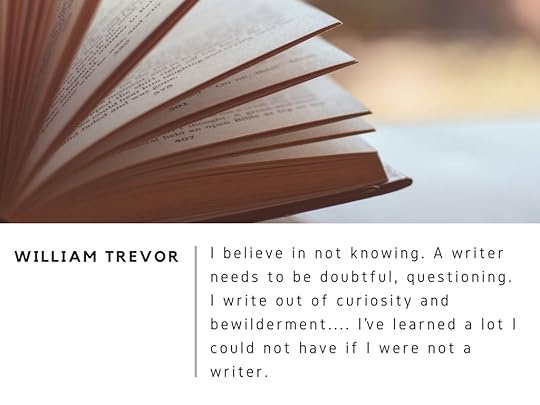
Reason #2: Stories Are About Growing
This is why stories are fundamentally about change. A story is about an arc—within the characters, within the plot, within the theme. What is found at the end of the story is not the same as what is presented in the beginning. Stories are never static, just as life is never static.
Although we read for comfort, entertainment, and even distraction, a good story should never be an entirely easy experience. If your story is asking those important questions we talked about above, then what it’s really doing is putting life under a microscope—both generally and for the individual reader and her personal experience in particular.
Here’s a worthwhile challenge from no less than Franz Kafka:
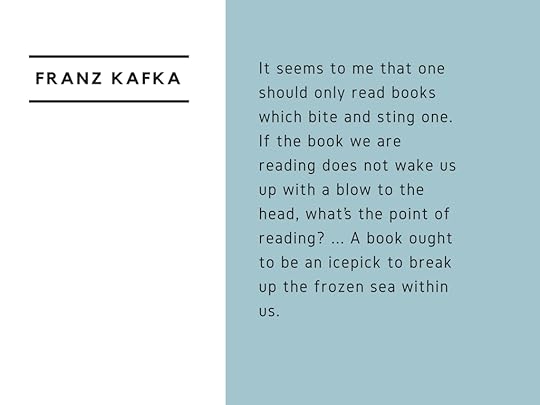
If readers are able to leave your story without at least feeling the prick of discomfort from the life questions being presented to them, then your story will never truly matter. If you want to write truly memorable fiction, you must be willing to challenge your readers to self-growth—by first challenging yourself in the writing.
Reason #3: Stories Are About Finding Patterns
I’m a pattern-seeker. It’s just how my brain works. I’m always looking for frameworks, organizational systems, similes, and metaphors (I have a probably unwelcome habit of looking at someone’s outfit and immediately turning it into a simile: “You look like an… avocado”).
I’m not alone in this. All of art is ultimately a categorization of life. As Jean Anouilh wrote:
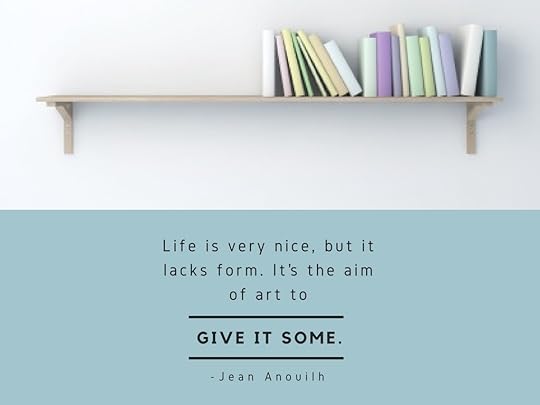
The patterns we recreate in our fiction are all present in real life. The structure of plot and character arcs are everywhere around us. The difference is that, in life, we aren’t always aware of the story beats in the bigger picture. They’re there, certainly, but we often lack the perspective to grasp them in a way that lets us immediately make sense of our own lives.
And so we turn to art to translate our raw observations into smaller patterns we can get our heads around—and which, in turn, help us get our heads around the bigger picture.
I write to make sense of the world. I don’t doubt that, on at least some level, perhaps purposefully, perhaps subconsciously, you are doing the same. Barbara Tuchman said:
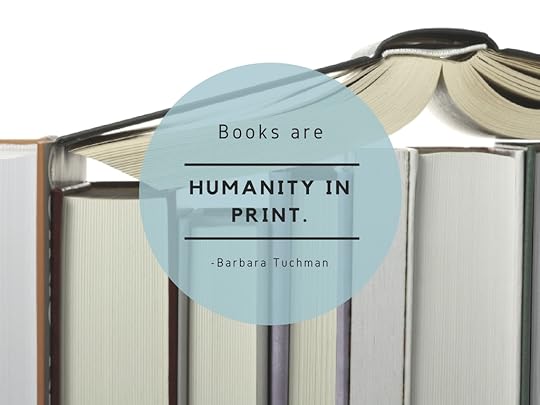
Stories are a metaphor for life. We read about Jean Valjean or Katniss Everdeen or Steve Rogers—and we see ourselves. Their crazy-dramatic adventures are really just metaphors for our own experiences. Through them, we gain perspective on our own lives. We begin to see the patterns. We catch a better glimpse of the big picture. We find some of the answers to our hard questions—which then, in turn, allow us to ask even better and harder questions in our lives and in our own stories.
What Art Demands From All of Us: Responsibility
As writers, we wield untold power to influence the lives of those around us. Whether you wield it wisely or carelessly is up to you. If you choose to forget that the very reason for art’s existence is its power to help humanity understand itself, your stories will still affect others. But not only will you be achieving, at best, a scattergun approach, you’ll also be missing out on your own opportunity to not just grow your art, but to grow yourself through your art.
Writers bear a great responsibility to be brave and honest in their fiction. But readers, too, must be responsible. John Locke famously wrote:
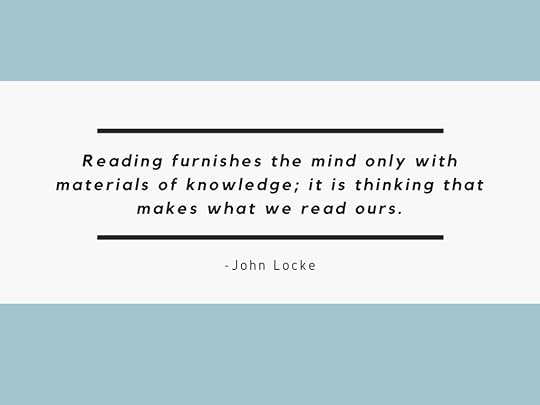
As both a reader and a writer, would you rather be Person #2—who refuses to look deeper into life by also refusing to look deeper into art—or Person #1—who rides art like it’s a thundering warhorse, ever upward and onward into the greater exploration of the only thing that can truly matter to any of us… life itself?
Wordplayers, tell me your opinion? What do you think art teaches us about life? And what do you think life teaches us about art? Tell me in the comments!http://www.podtrac.com/pts/redirect.mp3/kmweiland.com/podcast/how-to-benefit-from-the-biggest-reason-for-storytelling.mp3
Click the “Play” button to Listen to Audio Version (or subscribe to the Helping Writers Become Authors podcast in iTunes).
The post How to Benefit From the Biggest Reason for Storytelling appeared first on Helping Writers Become Authors.
 newest »
newest »
 newest »
newest »
 Wow!! This was one of the best pieces you've ever written. #1 has always been a yuge favorite of mine. Not to minimize #2 and #3. I've always been amazed at the forms dialogue takes. Erving Goffman (Presentation of Self in Everyday Life) was a big influence on my thinking and viewing. And as writers, these are the colors we paint in a reader's mind. And readers are attracted to all this. In fact I spend way too much time reading, when I need to be writing! Hah-hah! So thanks for a very thoughtful piece on the whole dynamic. Nice to see your "friend" starting to get it, huh?
Wow!! This was one of the best pieces you've ever written. #1 has always been a yuge favorite of mine. Not to minimize #2 and #3. I've always been amazed at the forms dialogue takes. Erving Goffman (Presentation of Self in Everyday Life) was a big influence on my thinking and viewing. And as writers, these are the colors we paint in a reader's mind. And readers are attracted to all this. In fact I spend way too much time reading, when I need to be writing! Hah-hah! So thanks for a very thoughtful piece on the whole dynamic. Nice to see your "friend" starting to get it, huh?

 I have a theory. My theory is that a person’s ability to engage with art is directly proportional to that person’s willingness to explore the inner depth of their own lives.
I have a theory. My theory is that a person’s ability to engage with art is directly proportional to that person’s willingness to explore the inner depth of their own lives.








